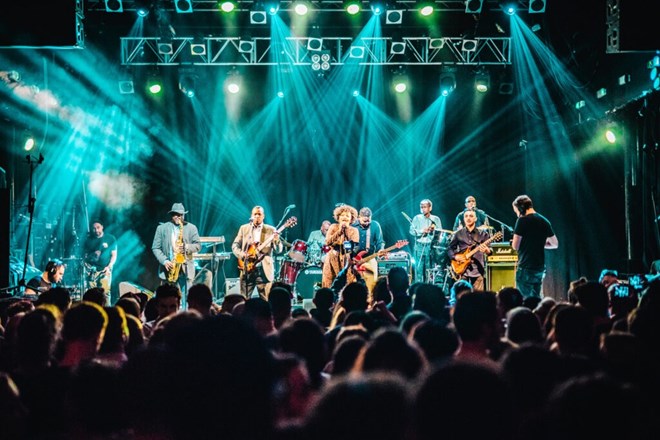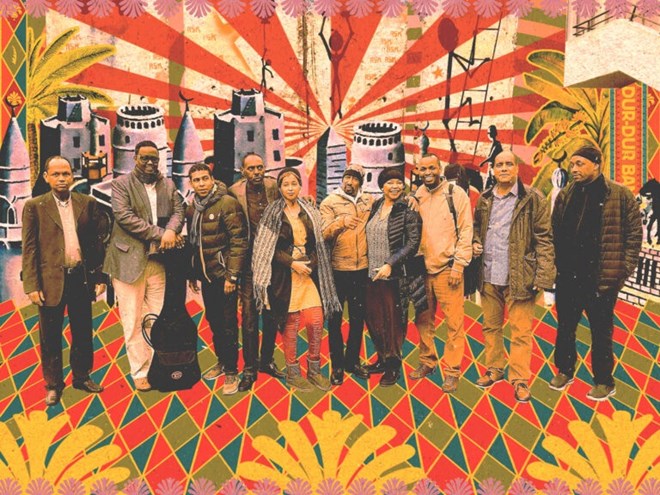hyphen.
Tuesday December 3, 2024
Founded in the cultural melting pot of 1980s Mogadishu, torn apart by war, reunited, then hobbled by Covid-19, a revitalised version of the Somali funk group is back on the road

Almost 40 years after it was founded, the Dur-Dur Band is set to play one of its biggest shows yet, at London’s Barbican Centre. Photograph by Rob Jones
In 1980s Mogadishu a golden era of musical experimentation was under way. Following the proclamation of an independent Somalia in 1960, a bloodless military coup in 1969 and the subsequent establishment of a socialist republic, the nation was gradually pulling away from the influence of the Soviet Union, ushering in a vibrant period of cultural cross-fertilisation.
Young people in the capital were listening to US soul by artists such as James Brown and the Jackson 5, and disco from America and Europe. Soon home-grown groups proliferated across the city, blending those influences with Somali-language lyrics and traditional instruments, such as the shareero lyre and ashiko drum.
One of the most popular was the Iftin Band, which held a residency at Al-Uruba club, playing a heady mix of polyrhythmic funk, soul and reggae-infused bass. Drawing crowds from across the social spectrum — young, old, rich and poor — their weekly sessions became the hottest ticket in town.
A few miles away at the Juba Hotel, another group was drawing up its own blueprint for the newly flowering Somali sound. Established by bassist Abdillahi Ujeeri and keyboardist Eise Dahir Qasim with the aim of poaching the best talent in Mogadishu and taking its name from the Somali word for “spring”, the Dur-Dur Band developed a potent fusion of traditional dhaanto rhythms, psychedelic rock guitars and Bollywood-inspired melodies. Buoyed by a vibrant market of bootleg live recordings, it quickly overtook the Iftin Band and even managed to recruit its rival’s singer, Sitey Xosul Wanaag.
“It was a great time to be young in Mogadishu,” says band manager Liban Noah. “We were going to parties and organising them ourselves, always wanting to dance to this exciting music that we had never heard before. Dur-Dur were the most popular band — their fusion sounded so unique.”
Now, almost 40 years later, the group is set to play one of its biggest shows yet, at the Barbican Hall in London. Surviving war, migration across continents and years without touching their instruments, this revitalised version of the Dur-Dur Band will present fans old and new with a setlist of its biggest hits.
For all its early success, the Dur-Dur Band’s story is one of extreme adversity. In 1991, the group faced its first and biggest challenge. The popularity of Somalia’s president Siad Barre was waning and his government had tightened its grip on the country, sparking a civil war that would continue for the following three decades. As fighting engulfed Mogadishu, a mass exodus began. Over the following years, vast numbers of Somalis — including members of the band — moved into neighbouring Djibouti, Ethiopia and Kenya, then spread to mainland Europe, the UK and the US.
For Noah, who left Somalia in 1987, the 1990s were spent travelling across Africa to Sweden and eventually settling in south-west London, where he built a life as a community worker and welfare adviser. By the early 2000s, he realised the Somali diaspora was missing something.
“Bands were such a big part of our culture but it seemed like there weren’t any Somali musicians in London,” he says. “There were a few keyboard players and singers all working with automated playback and no groups making new music together.”
He began to track down surviving members of the Dur-Dur Band, the Iftin Band and other groups that had soundtracked his youth in Mogadishu, in the hope of reuniting them on stage.
“Some had moved to Kenya and Ethiopia and were still playing in wedding bands but others were in a difficult place,” he says. “They were working as taxi drivers, bus drivers or carers, doing anything they could to just make a living.”

The Dur-Dur musicians in 2019, shortly before the Covid-19 pandemic forced several to retire. Photograph by Liban Noah, artwork by Ventral is Golden
In 2003, while organising a fundraiser at Brixton Academy in south London to help rebuild the national theatre in Mogadishu, Noah met Dur-Dur bassist Ujeeri, who was by then living in the US. By 2011, he finally had enough players to put on a show at a small venue in Southall, west London, featuring Ujeeri, singer Mohamed Ahmed Qomal, who was based in Ethiopia, and keyboardist Muhammed Karama, who lived in London.
“The Southall show was incredible — we just wanted to keep the Somali community engaged with their culture and we succeeded,” Noah says. “We had no idea that the [audience] would expand well beyond the diaspora in years to come.”
Over the next few years, the band played shows for the Somali community across London, from Rich Mix in Bethnal Green to west London’s Park Royal. As word of Dur-Dur’s revival spread, interest in the music of 1980s Mogadishu was growing among reissue labels. In 2018, Analog Africa reissued the group’s first two albums — Volume 1 (1986) and Volume 2 (1987). Meanwhile, the Ostinato Records compilation, Sweet As Broken Dates: Lost Somali Tapes from the Horn of Africa, was nominated for a Grammy.
“It was amazing when the labels got interested. It was like the hard work had finally paid off. We worked with Analog Africa to redefine the royalties and publishing,” Noah says, explaining that some of the original members who could not be part of the reformed band desperately needed the cash. “They were in tears when I sent them money for work they had done 20 or 30 years ago.”
Soon, the Dur-Dur Band was booked for tours throughout Europe, playing prestigious venues and festivals such as the Jazz Café in London and Le Guess Who in the Netherlands. Finally working as full-time musicians after years in exile, the seven-person lineup, comprising members from the UK, the US and Sweden, earned a reputation for raucously energetic shows. But another stumbling block was just around the corner.
“It felt like things were happening again. Then the Covid-19 pandemic put a stop to it all,” Noah says. “It was devastating. We lost 23 shows and several of the older members became seriously unwell and had to retire. We didn’t know what the future of the band would look like.”
Four years on, the Dur-Dur Band is recovering. In 2023 The Berlin Sessions, a live recording of a performance in Germany before Covid struck, was released. The group has also undergone a radical transformation, owing to members stepping down because of poor health or old age.
No longer featuring any of its founding players, Noah has recruited new talent to create a ship of Theseus version of the group. Now, the Dur-Dur Band is a showcase for Somali musical talent, including full-time members Fadumina and Farhia Fiska on vocals, alongside legendary guests such as Habib Sharabi, whom Noah describes as “the Tom Jones of Somalia”.
Finally heading back on the road, Noah and the band are looking forward to playing the Barbican.
“It’s going to be an incredible show of the new and old, plus Habib Sharabi has never been to the UK so that is very special,” Noah says. “I want Dur-Dur to now be like a skills transfer programme — somewhere that young Somali musicians can learn to perform live.”
Now, four decades on from the Dur-Dur Band’s founding, Noah wants the next big challenge to be finally taking its music back to Somalia.
“I see the scene developing back in Mogadishu now and our dream is to take the group home one day to tour there, to show a new generation what can be done,” he says. “After all the war and trauma, we just want to associate the Somali name with something positive — with music that makes you move.”
Dur-Dur Band play the Barbican Centre in London on 5 December